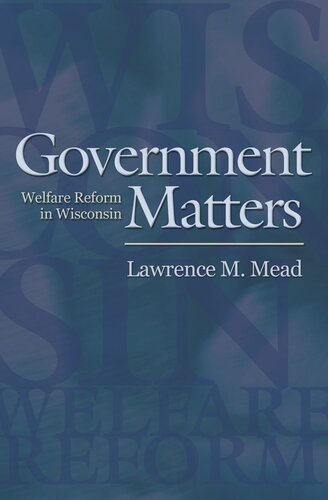

Most ebook files are in PDF format, so you can easily read them using various software such as Foxit Reader or directly on the Google Chrome browser.
Some ebook files are released by publishers in other formats such as .awz, .mobi, .epub, .fb2, etc. You may need to install specific software to read these formats on mobile/PC, such as Calibre.
Please read the tutorial at this link: https://ebookbell.com/faq
We offer FREE conversion to the popular formats you request; however, this may take some time. Therefore, right after payment, please email us, and we will try to provide the service as quickly as possible.
For some exceptional file formats or broken links (if any), please refrain from opening any disputes. Instead, email us first, and we will try to assist within a maximum of 6 hours.
EbookBell Team

4.3
28 reviews"Good government" is commonly seen either as a formidable challenge, a distant dream, or an oxymoron, and yet it is the reason why Wisconsin led America toward welfare reform. In this book, Lawrence Mead shows in depth what the Badger State did and--just as important--how it was done. Wisconsin's welfare reform was the most radical in the country, and it began far earlier than that in most other states. It was the achievement of legislators and administrators who were unusually high-minded and effective by national standards. Their decade-long struggle to overhaul welfare is a gripping story that inspires hope for better solutions to poverty nationwide.
Mead shows that Wisconsin succeeded--not just because it did the right things, but because its government was unusually masterful. Politicians collaborated across partisan lines, and administrators showed initiative and creativity in revamping welfare. Although Wisconsin erred at some points, it achieved promising policies, which then had good outcomes in terms of higher employment and reduced dependency. Mead also shows that these lessons hold nationally. It is states with strong good-government traditions, such as Wisconsin, that typically have implemented welfare reform best. Thus, solutions to poverty must finally look past policies and programs to the capacities of government itself. Although governmental quality is uneven across the states, it is also improving, and that bodes well for better antipoverty policies in the future.